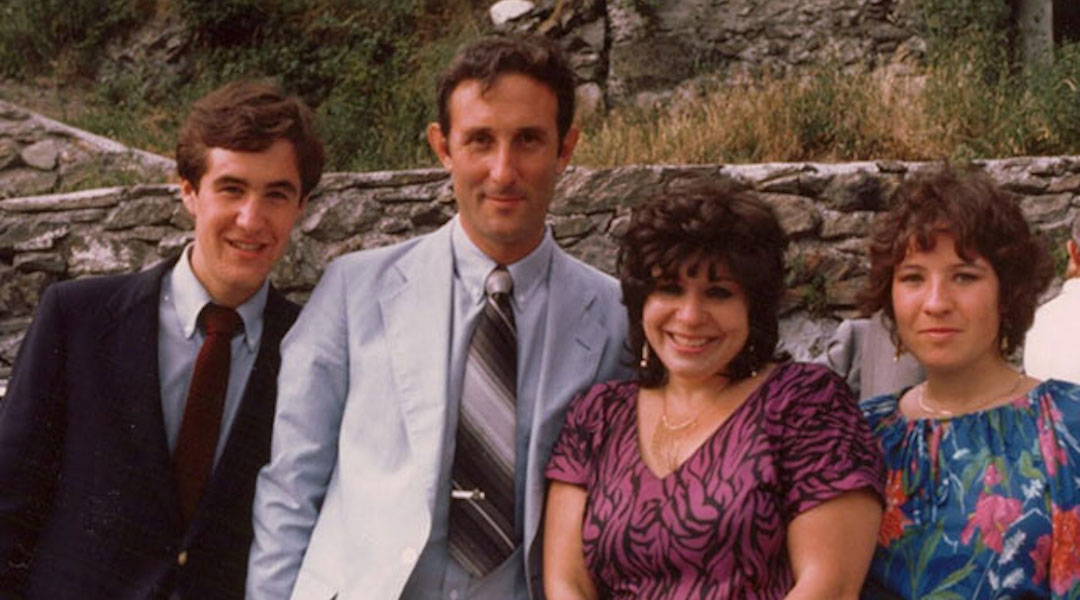Florence Berger, 83, Cornell professor and practitioner of the art of Jewish matchmaking
As an amateur matchmaker, she reportedly arranged more than two dozen matches that resulted in successful marriages.

Florence Berger, second from right, with her husband Toby and their children on a trip to Europe in the 1980s. (Courtesy Yale Class of 1962)
(JTA) — Florence Berger, as a much-admired professor at Cornell University’s School of Hotel Administration, once wrote a scholarly article about the executive-search industry. “Sensitivity to the interaction between persons and organizations is a major characteristic of executive recruits who are able to make the proper match between candidate and client,” she wrote.
Berger, who died July 13 at age 83, applied the same philosophy in a side gig that arguably made her better known than her scholarship: As an amateur matchmaker, she reportedly arranged more than two dozen matches that resulted in successful marriages, from the children of her academic colleagues to family members to couples she met on sabbatical in Japan and France.
Berger “is the kind of old-fashioned matchmaker who used to exist all over but is now regarded as a kind of archaic angel,” wrote Melanie Thernstrom in a 2005 New York Times Magazine article, “The New Arranged Marriage,” which focused largely on Jewish matchmakers, or shadchaniot. “Once Florence inscribes someone in her head, she doesn’t cross him or her off until he is wed.”
“I am fearless when it comes to matching,” Berger agreed in the same article, which also described some of her rules for dating and matchmaking. She tended not to match anyone under 30, suspecting that they wouldn’t be sufficiently “marriage minded.” And she made the couple promise to go out twice, “regardless of how they felt on the first date.” (Aleeza Ben Shalom, the star of the hit Netflix dating series “Jewish Matchmaking,” has a similar rule, which she calls “date ’em till you hate ’em.”)
And if there was a secret to Berger’s success, beyond persistence, it boiled down to something rather obvious: “finding partners with similar values and backgrounds.”
Born May 3, 1940, Florence Cohen grew up in West Hempstead on Long Island. She married her own high school sweetheart, Toby Berger, in 1961. (Toby Berger, an electrical engineering professor at Cornell and a nephew of the legendary New York Times reporter Meyer Berger, died in 2022.)
Florence attended Goucher College, then earned a master’s degree from Harvard University and a Ph.D. from Cornell University. As an assistant professor at Cornell, she taught courses in organizational behavior, human relations skills and hospitality industry training.
When she served as assistant dean of students at Cornell, “the art of being a Jewish mother was professionalized — keeping everyone safe, well-fed, making them feel welcome, and managing it all,” her son Larry told the New York Times.
In 1999, Berger received Cornell University’s highest teaching award, the Stephen H. Weiss Presidential Fellow Award for Distinguished Teaching.
Berger’s persistence in bringing people together was evident in the 2005 Times profile. When she learned that the reporter was not herself interested in a match, Berger responded: “Don’t be so sure about that!”
“I know this will make you angry,” Berger wrote Thernstrom as she continued to suggest matches, “but … I’ve made some people angry on the way to making them happy.”
Berger is survived by her son Larry and daughter, Elizabeth Mandell; her sister, Trudy Cohen Labell, and four grandchildren.
This article originally appeared on JTA.org.















